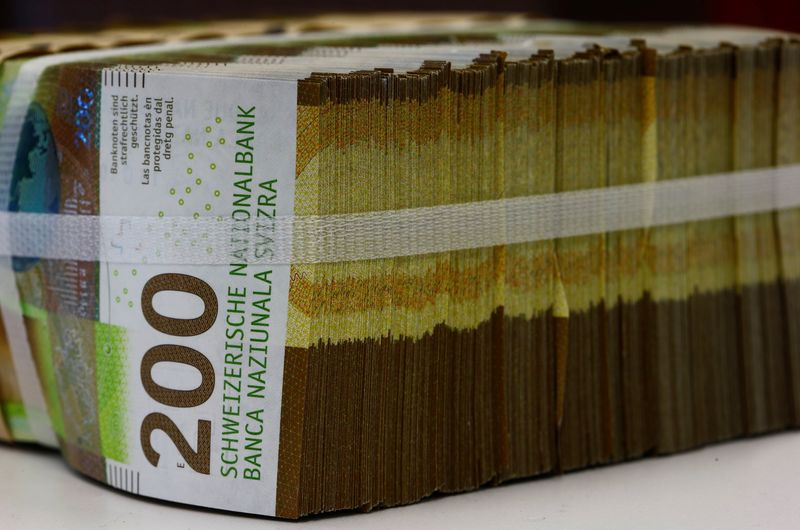By Harry Robertson
LONDON (Reuters) - As investors turn to the Swiss franc as an alternative to Japan's yen to fund carry trades, the risk of the currency staging one of its rapid rallies remains ever present.
The Swiss franc has long been used in the popular strategy where traders borrow currencies with low interest rates then swap them into others to buy higher-yielding assets.
Its appeal has brightened further as the yen's has dimmed. Yen carry trades imploded in August after the currency rallied hard on weak U.S. economic data and a surprise Bank of Japan rate hike, helping spark global market turmoil.
The Swiss National Bank (SNB) was the first major central bank to kick off an easing cycle earlier this year and its key interest rate stands at 1.25%, allowing investors to borrow francs cheaply to invest elsewhere.
By comparison, interest rates are in a 5.25%-5.50% range in the United States, 5% in Britain, and 3.75% in the euro zone.
"The Swiss franc is back as a funding currency," said Benjamin Dubois, global head of overlay management at Edmond de Rothschild Asset Management Suisse.
STABILITY
The franc is near its highest in eight months against the dollar and in nine years against the euro, reflecting its status as a safe-haven currency and expectations for European and U.S. rate cuts.
But investors hope for a gradual decline in the currency's value that could boost the returns on carry trades.
Speculators have held on to a $3.8 billion short position against the Swiss franc even as they have abruptly moved to a $2 billion long position on the yen, U.S. Commodity Futures Trading Commission data shows.
Analysts commonly see a large short position as a sign that a currency is being used to fund carry trades.
"There is more two-way risk now in the yen than there has been for quite some time," said Bank of America senior G10 FX strategist Kamal Sharma. "The Swiss franc looks the more logical funding currency of choice."
BofA recommends investors buy sterling against the franc, arguing the pound can rally due to the large interest rate gap between Switzerland and Britain, in a call echoed by Goldman Sachs.
The SNB appears set to cut rates further in the coming months as inflation dwindles. That would lower franc borrowing costs and could weigh on the currency, making it cheaper to pay back for those already borrowing it.
Central bankers also appear reluctant to see the currency strengthen further, partly because of the pain it can cause exporters. BofA and Goldman Sachs say they believe the SNB stepped in to weaken the currency in August.
"The SNB will likely guard against currency appreciation through intervention or rate cuts as required," said Goldman's G10 currency strategist Michael Cahill.
'INHERENTLY RISKY'
Yet the Swissie, as it is known in currency markets, can be an unreliable friend.
Investors are prone to pile into the currency when they get nervous, thanks to its long-standing safe-haven reputation.
Cahill said the franc is best used as a funding currency at moments when investors are feeling optimistic.
A quick rally in the currency used to fund carry trades can wipe out gains and cause investors to rapidly unwind their positions, as the yen drama showed. High levels of volatility or a drop in the higher-yielding currency can have the same effect.
The SNB and Swiss regulator Finma declined to comment when asked by Reuters about the impact of carry trades on the Swiss currency.
As stock markets tumbled in early August, the Swiss franc jumped as much as 3.5% over two days. The franc-dollar pair has proven sensitive to the U.S. economy, often rallying hard on weak data that causes U.S. Treasury yields to fall.
"Any carry trade is inherently risky and this is particularly true for those funded with safe-haven currencies," said Michael Puempel, FX strategist at Deutsche Bank.
"The main risk is that when yields move lower in a risk-off environment, yield differentials compress and the Swiss franc can rally," Puempel added.
A gauge of how much investors expect the Swiss currency to move, derived from options prices, is currently at around its highest since March 2023.

"Considering the central banks, you can see how there may be more sentiment for some carry players to prefer the franc over the yen," said Nathan Vurgest, head of trading at Record Currency Management.
"The ultimate success of this carry trade might still be dependent on how quickly it can be closed in a risk-off scenario," Vurgest said, referring to a moment where investors cut their riskier trades to focus on protecting their cash.